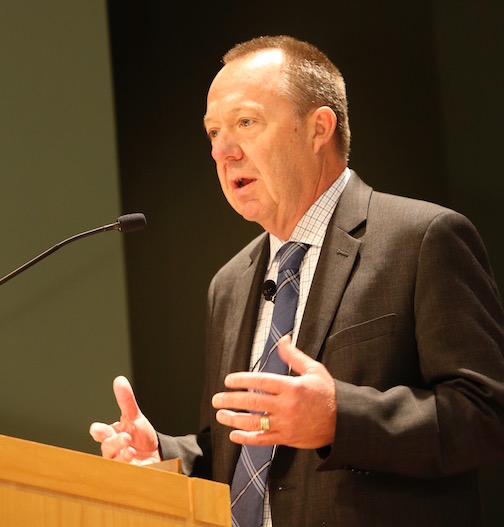WASHINGTON, DC – AAHomecare has joined 17 other major healthcare provider organizations seeking to fix a taxation penalty embedded in the CARES Act. Without congressional action, many providers will lose more than a fifth of the grant funds approved by Congress to help healthcare providers respond to the COVID-19 pandemic.
 The coalition is asking Congress: 1) to ensure that provider relief funds and similar funding provided in response to COVID-19 are not taxable; and 2) that entities receiving these funds maintain tax deductions attributable to these funds.
The coalition is asking Congress: 1) to ensure that provider relief funds and similar funding provided in response to COVID-19 are not taxable; and 2) that entities receiving these funds maintain tax deductions attributable to these funds.
In the letter, the group asserts: “It is critical that the actions taken to support front-line caregivers and hospitals are not diluted by technical issues around the taxability of support funds. The current grant structure creates an inefficient process that provides grants, and then takes back 21 percent or more of the same grants for many of the organizations that need the assistance the most.”
“HME suppliers nationwide are faced with daunting new challenges in serving their patients and communities in this pandemic,” notes AAHomecare president and CEO Tom Ryan. “Congress has provided welcome relief to help offset revenue losses and higher costs that the entire healthcare continuum is currently experiencing; even so, many providers are still facing severe financial impacts as a result of this crisis. Clawing back one fifth of the CARES Act relief will only magnify these pressures for the HME community and other healthcare providers.”
Full text of the letter is included below.
Dear Majority Leader McConnell, Speaker Pelosi, Minority Leader Schumer, Minority Leader McCarthy, Chairman Neal, Chairman Grassley, Ranking Member Brady, and Ranking Member Wyden:
The undersigned groups represent nearly all provider facets of the U.S. health care system, from physicians and nurses to hospitals to post-acute care providers and dentists, the vast majority of whom pay taxes to federal and state governments. We seek Congressional action to clarify and correct what we believe are the unintentional tax consequences of policies meant to provide vital funding to health care providers through the Public Health and Social Services Emergency Fund (PHSSEF) and other programs as part of the nation’s response to the novel coronavirus (COVID- 19) pandemic.
Government payments to corporations are generally considered taxable. Congress recognized this concern in enacting the Paycheck Protection Program (PPP) in the Coronavirus Aid, Relief, and Economic Security (CARES) Act in March 2020. That program included a provision specifically exempting PPP funds from being taxed. After passage of the CARES Act, there was a realization that Congress inadvertently failed to protect the ability for entities receiving PPP funds from maintaining their tax deductions for expenditures attributable to PPP funds. We understand there is bipartisan support to address the deduction issue in upcoming legislation, and the U.S. House of Representatives included such a correction in the Health and Economic Recovery Omnibus Emergency Solutions (HEROES) Act, which passed the House on May 15.
We respectfully urge a similar clarification for tax-paying health care providers to ensure that: 1) PHSSEF and similar funding provided in response to COVID-19 is not taxable; and 2) that entities receiving these funds maintain tax deductions attributable to these funds. It is essential that these provisions are enacted together to avoid the situation that occurred with the PPP. Without such a correction, tax-paying health care providers lose at least 21 percent of the benefit of these funds and are treated unequally as compared to non-tax-paying providers. We do not believe Congress intended such a consequence in enacting the CARES Act and other COVID-19- related legislation.
The Congressional response to the COVID-19 pandemic has been swift and decisive. It is critical that the actions taken to support front-line caregivers and hospitals are not diluted by technical issues around the taxability of support funds. The current grant structure creates an inefficient process that provides grants, and then takes back 21 percent or more of the same grants for many of the organizations that need the assistance the most. Congress should streamline the assistance process and ensure the target entities receive 100 percent of the assistance Congress intended.
Sincerely,
Ambulatory Surgery Center Association
American Academy of Family Physicians
American Academy of Physical Medicine and Rehabilitation American Association for Homecare
American Association of Nurse Practitioners
American College of Physicians
American Dental Association
American Hospital Association
American Medical Association
American Nurses Association
American Occupational Therapy Association
American Optometric Association
American Physical Therapy Association
Federation of American Hospitals
National Association for Behavioral Healthcare
National Hospice and Palliative Care Organization
Premier Healthcare Alliance
Private Practice Section of the American Physical Therapy Association U.S. Chamber of Commerce


